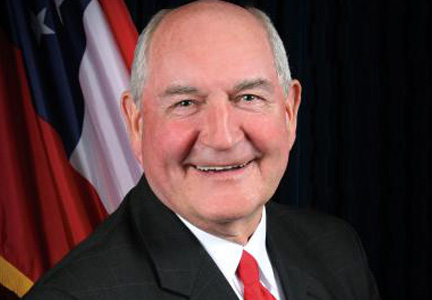WASHINGTON — The US Dept. of Agriculture (USDA) introduced $12 billion in programs to assist farmers financially impacted by the ongoing trade disputes across the world.
The Market Facilitation Program will make payments to farmers and producers of hogs, soybeans, sorghum, corn, wheat, cotton and dairy.
The USDA also announced that it would use the CCC Charter Act and other authorities to implement a Food and Distribution Program through the Agricultural Marketing Service (AMS) to purchase unexpected surplus of affected commodities like beef, pork, milk, fruits, nuts, rice and legumes.
The final measure directed by the USDA was to use the Charter Act to authorize a Trade Promotion Program that will be administered by the Foreign Agriculture Service (FAS). The program and the private sector will work together to develop new export markets for farm products.

US Secretary of Agriculture Sonny Perdue stated that President Donald Trump ordered him to work on a short-term relief strategy to protect agricultural producers while the administration continues negotiating trade deals.
“The President promised to have the back of every American farmer and rancher, and he knows the importance of keeping our rural economy strong. Unfortunately, America’s hard-working agricultural producers have been treated unfairly by China’s illegal trading practices and have taken a disproportionate hit when it comes illegal retaliatory tariffs,” Perdue said. “USDA will not stand by while our hard-working agricultural producers bear the brunt of unfriendly tariffs enacted by foreign nations. The programs we are announcing today help ensure our nation’s agriculture continues to feed the world and innovate to meet the demand.”
In response to the announcement, The North American Meat Institute (NAMI) released a statement regarding the USDA’s decision.
“We appreciate the Administration’s announcement today that the US Dept. of Agriculture will provide short-term relief to hog and cattle producers who are facing significant economic losses resulting from tariffs imposed by some trading partners. We look forward to the details and the rollout of the program,” NAMI CEO Barry Carpenter said.
“The futures markets are hinting at the gloomy outlook for the livestock and agriculture sector,” Carpenter continued. The magnitude of potential losses from markets around the world where US meat products will become far less competitive cost-wise will reach deep into rural America, and livestock producers will likely scale back herds as they face declining, export-linked demand for their livestock.”
The National Pork Producers Council (NPPC) released a statement commending President Trump’s decision for the $12 billion program, but also highlighted the issues farmers will face for the remainder of 2018.
“US pork, which began the year in expansion mode to capitalize on unprecedented global demand, now faces punitive tariffs on 40 percent of its exports,” said NPPC President Jim Heimerl, a pork producer from Johnstown, Ohio. “The restrictions we face in critical markets … have placed American pig farmers and their families in dire financial straits. We thank the President for taking immediate action. While we recognize the complexities of resetting US trade policy, we hope that US pork will soon regain the chance to compete on a level playing field in markets around the globe.”
Kent Bacus, director of international trade for the National Cattlemen’s Beef Association, also added his comments after the announcement of the programs.
“For many years, US beef has been a target of high tariffs and restrictive trade policies from notorious actors like China and the European Union. We support a vigorous approach to tearing down trade barriers, including non-tariff barriers that are not based on science,” Bacus said. “Removing China’s highly restrictive barriers on US beef exports could unlock the full potential of that market and result in $4 billion in annual sales. Here at home, beef producers need relief from onerous federal regulations that undermine their businesses. Let’s start by fixing the restrictive hours-of-service rules for livestock haulers, modernizing the Endangered Species Act, and ending the 2015 Waters of the United States rule once-and-for-all.”

